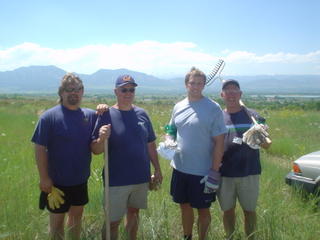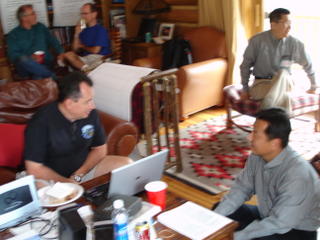Agustine's Confession Quotations
Last year I read, for the first time, Agustine's Confessions--recognized as the first true autobiography. As part of my DMin program I wrote up a book summary but as an addendum wrote out quotes that I wanted to have available. They are now posted here for you.
On the singularity of being and doing
“In you it is not one thing to be and another to live: the supreme degree of being and the supreme degree of life are one and the same thing.” P. 8
On love and lust
“The single desire that dominated my search for delight was simply to love and to be loved.” P. 24
To me it was sweet to love and to be loved, the more so if I could also enjoy the body of the beloved. I therefore polluted the spring water of friendship with the filth of concupiscence. I muddied its clear stream by the hell of lust, and yet, though foul and immoral, in my excessive vanity, I used to carryon in the manner of an elegant man about town.” P. 35
“I prayed you for chastity and said: ‘Grant me chastity and continence, but not yet.’ I was afraid you might bear my prayer quickly, and that you might too rapidly heal me of the disease of lust which I preferred to satisfy rather than suppress.” P. 145
On the nature of God
“Your omnipotence is never far from us, even when we are far from you.” P. 25
“Lord, you are always working and always at rest.” P. 304
On obedience
“But when God commands something contrary to the customs or laws of a people, even if that has never been previously done, it has to be done. If it has fallen into disuse, it must be restored. If it has not been established, it must be established. If it is lawful for a king in a city within his realm to give an order which none before him nor he himself had previously issued, and if it is not contrary to the social contract of his city to obey. Or indeed if it would be contrary to the social agreement not to obey..then how much more must God, the governor of all his creation, be unhesitatingly obeyed in whatever he commands! Just as among the authorities in human society a superior authority has a greater power to command obedience than an inferior officer, so God is supreme over all.” P. 46
On sin
“But in me there had emerged a very strange feeling which was the opposite of theirs. I found myself heavily weighed down by a sense of being tired of living and scared of dying. P. 59
On friendship
There were other things which occupied my mind in the company of my friends: to make conversation, to share a joke, to perform mutual acts of kindness, to read together well-written books, to share in the trifling and in serious matters, to disagree though without animosity—just as a person debates with himself—and in the very rarity of disagreement to find the salt of normal harmony, to teach each other something or to learn from one another, to long with impatience for those absent, to welcome them with gladness on their arrival. These and other sighs come from the heart of those who love and are loved and are expressed through the mouth through the tongue, through the eyes, and a thousand gestures of delight, acting as fuel to set our minds on fire and out of many to forge unity. This is what we love in friends.” P. 60
And so I came to Milan to Ambrose the bishop, known throughout the world as among the best of men, devout in your worship. At that time his eloquence valiantly ministered to your people, ‘the abundance of your sustenance’ and the ‘gladness of oil, and the sober intoxication of your wine. I was led to him by you, unaware that through him in full awareness, I might be led to you. That ‘man of God’ received me like a father and expressed pleasure at my coming with a kindness most fitting in a bishop. I began to like him, at first indeed not as a teacher of the truth, for I had absolutely no confidence in your Church, but as a human being who was kind to me.[1]
[1] P.88
On faith
“Then little by little, Lord, with a most gentle and merciful hand you touched and calmed my heart. I considered the innumerable things I believed which I had not seen, events which occurred when I was not present, such as many incidents in the history of the nations, many facts concerning places and cities which I had never seen, many thing accepted on the word of friends, many from physicians, many from other people. Unless we believed what we were told, we would do nothing at all in this life. Finally, I realized how unmovable sure I was about the identity of my parents from whom I came, which I could not know unless I believed what I had heard.” P.95
On habits and spiritual bondage
“The enemy had a grip on my will and so made a chain for me to hold me a prisoner. The consequence of a distorted will is passion. By servitude to passion, habit if formed, and habit to which there is no resistance becomes necessity. By these links, as it were, connected one to another (hence my term chain), a harsh bondage held me under restraint.” P. 140
On conversion
“What I once feared to lose was now a delight to dismiss. You turned them out and entered to take their place, pleasanter than any pleasure…”
p. 155
On the happy life
“There is a delight which is given not to the wicked, but to those who worship you for no reward save the joy that you yourself are to them. That is the authentic happy life, to set one’s joy on you, grounded in you and caused by you. That is the real thing, and there is no other. Those who think that the happy life is found elsewhere, pursue another joy and not the true one. Nevertheless their will remains drawn toward some image of the true joy.” P. 199
On worship music
“I feel that when the sacred words are chanted well, our souls are moved and are more religiously and with a warmer devotion kindled to piety than if they are not so sung. All the diverse emotions of our spirit have their various modes in voice and chant appropriate in each case, and are stirred by a mysterious inner kinship…Thus I fluctuate between the danger of pleasure and the experience of the beneficent effect, and I am more led to put forward the opinion (not as an irrevocable view) that the custom of singing in Church is to be approved, so that through the delights of the ear the weaker mind may rise up towards the devotion of worship. Yet when it happens to me that the music moves me more than the subject of the song, I confess myself to commit a sin deserving punishment, and then I would prefer not to have heard the singer.” p. 207
On pride
“Often the contempt of vainglory becomes a source of even more vainglory.” P. 217
On gender equality
“For you ‘made man male and female’ in your spiritual grace to be equal so that physical gender makes no distinction of male and female, just as there is ‘neither Jew nor Greek, neither slave nor free person.” P. 293
On judging nonbelievers
“The spiritual person does not judge the storm-tossed peoples of this world. How can he ‘judge of those outside’ when he does not know who will come out of the world into the sweetness of your grace and who will remain in the permanent bitterness of godlessness?” p. 293
On good deeds
“You gathered a society of unbelievers to share a common aspiration, so that the zeal of the faithful should ‘appear’ and so bring forth for you works of mercy, distributing to the poor their earthly possessions so as to acquire celestial reward.” P. 303
















